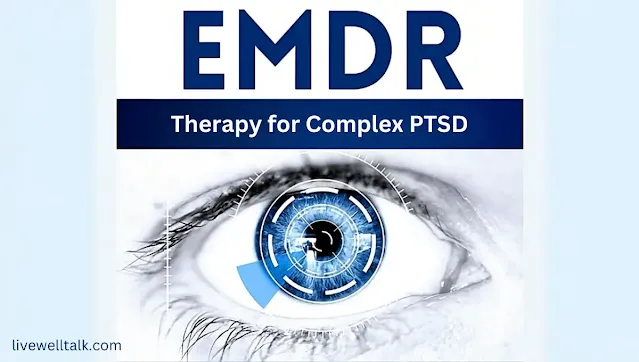Complex PTSD (C-PTSD) is a debilitating condition that arises from repeated or prolonged exposure to traumatic events, often during childhood. It leaves individuals struggling with a constellation of symptoms beyond those of PTSD, including difficulties with emotions, self-image, and relationships.
EMDR Therapy for Complex PTSD
The road to healing from Complex PTSD can be long, but EMDR therapy (Eye Movement Desensitization and Reprocessing) has emerged as a powerful tool for those seeking relief from C-PTSD.
What is EMDR Therapy?
EMDR is a psychotherapy approach that helps individuals process traumatic memories in a safe and controlled environment. It utilizes bilateral stimulation, which involves stimulating both sides of the body through eye movements, tapping, or auditory tones. While focusing on a disturbing memory, this bilateral stimulation is believed to facilitate the brain's natural information processing, allowing the memory to be desensitized and integrated with a more positive perspective.How Can EMDR Help with Complex PTSD?
C-PTSD often involves a constellation of traumatic memories, negative beliefs about oneself and the world, and difficulties managing emotions. EMDR therapy can be particularly effective for C-PTSD by:- Targeting Specific Traumatic Memories: EMDR allows you to identify and address specific traumatic memories that contribute to your current symptoms.
- Reducing Emotional Distress: By processing these memories, EMDR can help decrease the intensity of negative emotions associated with them.
- Building Positive Self-Beliefs: EMDR can help you develop more adaptive beliefs about yourself and your ability to cope.
- Improving Emotional Regulation: EMDR can equip you with skills to manage overwhelming emotions that often accompany C-PTSD.
What to Expect During EMDR Therapy for Complex PTSD
EMDR therapy typically follows an eight-phase protocol:- History Taking and Treatment Planning: The therapist gathers information about your history and develops a personalized treatment plan.
- Preparation: You learn coping skills to manage potential distress that may arise during therapy.
- Assessment: You identify a specific traumatic memory and the negative beliefs and emotions associated with it.
- Desensitization: You focus on the memory while engaging in bilateral stimulation to reduce its emotional intensity.
- Installation: You replace negative beliefs with more positive ones using bilateral stimulation.
- Body Scan: You check for any physical tension related to the memory and use bilateral stimulation to release it.
- Closure: The therapist summarizes the session, provides grounding techniques, and assigns homework (if needed).
- Reevaluation: You discuss progress and adjust the treatment plan as necessary.
How Many EMDR Sessions Does Complex PTSD Treatment Require?
The number of EMDR sessions needed for complex PTSD can vary depending on the severity of your condition and the number of traumatic memories you want to address.Generally, complex PTSD treatment may require more sessions compared to PTSD due to the additional layers of emotional and relational issues involved. Typically, it can range from 10 to 20 sessions, but some cases may require more. Be patient and committed to the therapeutic process, as healing can take time.
Benefits of EMDR for Complex PTSD
EMDR offers several benefits for individuals with C-PTSD:
- Reduced emotional intensity: By processing the trauma, EMDR can help lessen the emotional charge associated with the memories, leading to a sense of calmness and emotional control.
- Improved self-perception: C-PTSD often leads to negative self-beliefs. EMDR can help individuals develop a more positive and compassionate view of themselves.
- Enhanced emotional regulation: The ability to manage difficult emotions is crucial for healing. EMDR can equip individuals with coping mechanisms to navigate strong emotional responses.
- Strengthened relationships: C-PTSD can strain relationships. EMDR can foster better communication and emotional connection with loved ones.
Is EMDR Right for You?
While EMDR has shown promising results for complex PTSD, it's not a one-size-fits-all solution. If you're interested in exploring EMDR therapy, consider these factors:- Finding a qualified therapist: Look for a therapist trained and experienced in EMDR therapy, particularly for complex PTSD cases.
- Understanding the process: Discuss EMDR with your therapist to understand its potential benefits and limitations.
- Commitment to therapy: EMDR can be a powerful tool, but it requires your active participation and commitment to the therapeutic process.
Finding Hope and Healing with EMDR
Complex PTSD can be a challenging condition, but you don't have to face it alone. EMDR therapy offers a powerful tool for processing traumatic memories, reducing emotional distress, and reclaiming your life. By working with a qualified therapist, you can embark on a journey towards healing and build a brighter future.Additional Resources:
- The EMDR International Association: https://www.emdria.org/
- The National Center for PTSD: https://www.ptsd.va.gov/
- The International Society for Traumatic Stress Studies: https://istss.org/home
- he CPTSD Foundation: https://cptsdfoundation.org/
Conclusion
Healing from C-PTSD is a journey, but one filled with hope. EMDR therapy offers a powerful tool to help you process past traumas, rewrite your narrative, and reclaim your life. With dedication and the support of a qualified therapist, you can manage your symptoms, build resilience, and experience lasting positive change.


Comments
Post a Comment